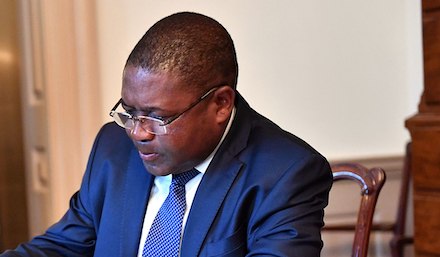President Nyusi. Photo: Wikimedia Commons.
Southern African countries believe Mozambique President Filipe Nyusi’s invitation for Western military intervention in his country’s civil conflict in Cabo Delgado region could escalate the war and destabilize Africa.
The region is rich in natural gas and France has invested heavily in a $20 billion project. President Nyusi wants American Special Forces soldiers, in addition to Portuguese and other EU troops to train Mozambican troops to repel the spreading insurgency in the northeastern part of the country linked to the Islamic State has unsettled the South African Development Community Organ on Politics, Defense and Security, of the South African Development Community (SADC).
SADC, led by mostly former liberation movements are weary of American involvement in the region’s politics, arguing that the region had the capacity to resolve the conflict without external involvement. The insurgency, near some of the world’s biggest gas reserves, has killed more than 2, 500 civilians and displaced more than 670, 000 people.
“President Nyusi’s invitation of Portuguese, American and EU countries to support Mozambican troops has not gone down well with SADC Organ on Politics, Defense and Security headed by Botswana President Mokgweetsi Masisi,” says a senior political source in Harare. “The whole region including South Africa, Zimbabwe, Tanzania, Namibia and Angola now fear that the involvement of the Americans in the offensive against the Islamic rebels in Cabo Delgado will complicate the conflict.”
“SADC is quite able to deal with the conflict but if the Americans, EU and Portugal start investing in this conflict, it will force the region to watch from the terraces and defend their territories while Mozambique burns,” the senior official said. “The US interventionists policies cannot be underestimated and the humanitarian consequences for Mozambicans in the north will be grave. With the latest American involvement, the political solution to the conflict seems as distant as ever. All this will have a dreadful toll on the Cabo Delgado population and the regional trajectory of the conflict.”
So far, the SADC region has through the Organ on Politics, Defense and Security roundly condemned the indiscriminate attacks on the civilian population including on women and children. Mozambican President Nyusi has put the military in charge of combating the growing Islamic State-linked insurgency in the natural gas-rich Cabo Delgado province, after limited success by the police force. His country has struggled to contain the insurgency.
This violence has prompted Total SE to evacuate workers from its $20 billion liquefied natural gas project as attacks encroached on what is Africa’s biggest private investment. Political sources in Zimbabwe, Namibia, and South Africa fear that this conflict will draw in regional and major powers and fuel more instability. The conflict is fast becoming an interlocking conflict with so many interests by major powers.
“Nyusi has sold out to the Americans. Zimbabwe, Namibia and Angola have vast experience in resolving war conflict. These countries intervened in the DRC conflict and Zimbabwe played a prominent role in ending the war against Renamo bandits,” a senior South African politician who did not want to be identified said. “Sidelining these countries in favor of American forces and others from the EU under the guise of training Mozambican troops will not help things out. As we speak right now, regional leaders are unhappy with Nyusi.”
Even though the American marine intervention is modest in size and scope, regional leaders fear this signals the entry of the United States military into a counterinsurgency effort that will bring regional instability and a conflict that will be hard to end.
The economic toll of the war inside Cabo Delgado has been devastating with houses, schools and businesses sustaining significant damage.
Mozambique has not healed from the wounds of the 1975–1992 conflict against the U.S. and apartheid South Africa sponsored Renamo bandits, which led to the death of thousands of people and damage of infrastructure running into hundreds of millions of dollars.
“This has heightened insecurity in the area, leading to a serious humanitarian crisis, especially the need for the provision of basic services, such as food, water and shelter to the affected population,” the Botswana president, who chairs SADC’s Organ on Politics, Defense and Security has said. “SADC condemns in the strongest possible terms this heinous act of cowardice. It is our fervent hope that the perpetrators will be quickly arrested and brought to justice. These attacks are an affront to peace and security, not only in Mozambique, but also in the region and the international community as a whole.”
SADC leaders have been meeting in Maputo, the Mozambique capital to discuss ways to end the conflict which they fear might spiral out of control into the rest of the region. The sticking issue will be how Nyusi will allow the SADC region to play a prominent role in ending the conflict as opposed to opening doors to major external powers.
Zimbabwe, which has a powerful army and once helped rout Renamo when it was a South African funded terrorist army in Mozambique has ruled out any unilateral intervention and says it must be a SADC operation.
The fighting in Cabo Delgado, in several ways resembles other complex conflicts in Syria, Yemen, Somalia and elsewhere across the world where significant geo-strategic stakes are at play. Regional leaders fear that the U.S., Russia, and China could all be drawn into the fighting.
When South Africa intensified its racist apartheid policy in the 1940s, it gave rise to nationalism in the region and the birth of liberation movements. Most are now in government in the SADC member states. This Southern Africa region has enjoyed relative stability, apart from the Congo conflict, in recent years. Now the flare-up in Mozambique could change all this.
The SADC has 16 member countries. It has been accused of being a toothless bulldog at times; such as on this occasion and the inability to help halt the Mozambique war.
Sifelani Tsiko is a veteran journalist based in Harare, Zimbabwe [email protected]







